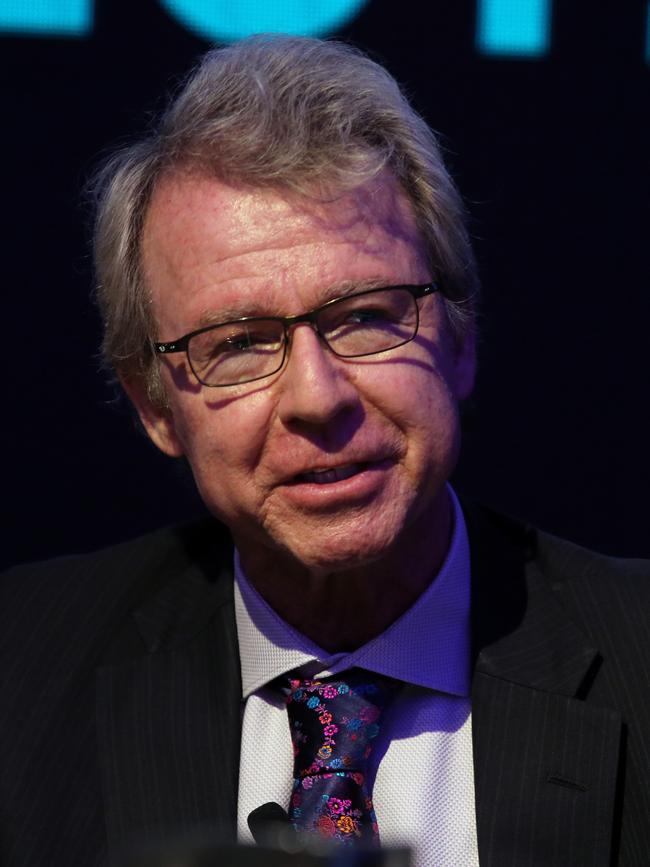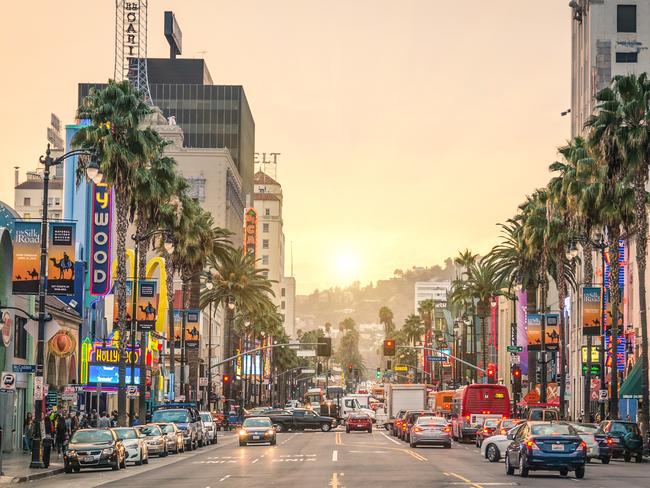US election 2020: What Trump v Biden presidency means for Australia
The US Presidential election will have huge implications for Australia. This is how it will affect our economy, industries and even politics.
National
Don't miss out on the headlines from National. Followed categories will be added to My News.
The outcome of this week’s US election will have direct impact on Australia regardless of who emerges as victor. Charles Miranda, David Mills, Anthony Keane, and Jennifer Dudley-Nicholson reveal how.
THE ECONOMY
Economists say a Biden administration will be better for Australia because it will reduce trade tensions between the US and China and improve global financial sentiment.
AMP Capital chief economist Shane Oliver said a Democrat win would pump more money into the US economy, assist diplomacy and “be more predictable”.
“It would also mean less focus on trade wars – I think Biden would probably try to solve the problems with China,” he said.
CommSec senior economist Ryan Felsman said a “more collaborative administration may be good from a trade perspective”.
“Biden was Vice President for eight years – he’s a known quantity and isn’t going to rock the boat,” he said.
Currency movements have been ignored by most Australians this year with international borders closed, but it’s been a bumpy ride. Our dollar plunged below US58c in March, bounced back to US74c in September and is now back near US71c.
CommSec has analysed election outcome scenarios and concluded the Aussie dollar was more likely to fall in the short term.
BetaShares chief economist David Bassanese said he expected our dollar to weaken in 2021, trading in the high 60c range.
“With the election out of the way I think the US economy will remain relatively strong, which is probably going to weaken our currency,” he said.


INVESTMENTS
Sharemarkets are expected to improve next year whoever wins the election, but not after some short-term volatility – especially if the outcome is not immediately clear.
Mr Bassanese said the biggest threat was a contested result.
“If it’s drawn out through the courts for a few months that’s going to be a short-run negative for our market,” he said.
“Whoever wins we are likely to get a pretty good US fiscal stimulus package. If it’s Biden, the stimulus may be delayed until he’s sworn into office, but the package may be bigger.”
A Biden win would boost global financial markets, Bassanese said.

“International co-operation has been hampered under the Trump presidency,” he said. “He hasn’t wanted to engage and as a result he hasn’t achieved all that much.”
But some US shares could fall under Biden amid plans to unwind corporate tax cuts and tighten regulations on tech stocks, Bassanese said.
CommSec says savvy investors are already loading up on renewable and green energy stocks in anticipation of a more environmentally-friendly Biden presidency.

TOURISM
Coronavirus remains the bugbear of global travel, and the USA’s handling of the outbreak will have ramifications for Australian tourism.
In a paper on Biden and Trump, Associate Professor Adam Kamradt-Scott from Sydney University warned that by not signing up to the COVID-19 Global Access initiative, the US has potentially “locked itself out of one pathway to accessing vaccines”.
That, along with widespread “vaccine hesitancy” in the US, would have implications for
“the willingness of other countries to permit not only their citizens to travel to the United States, but also for Americans to travel internationally,” Assoc Prof Kamradt-Scott stated.
Tourism expert Associate Professor Pierre Benckendorff from the University of Queensland said COVID-19 “will continue to be the most important determinant of tourism demand for the next three-four years”.


“I don’t see Australia agreeing to a travel bubble until daily cases in the US come right down. Clearly Trump’s COVID strategy is not working very well. If Biden has more success managing COVID we may see a travel bubble sooner than we would under a Trump administration,” he said.
“This would be beneficial to the tourism industry because the USA is our third largest source market.”
Travel bubbles with individual states that were controlling the virus, such as California, were a future possibility, he added.
“A less inflammatory relationship between the US and China would be good for tourism,” he said. “This is important because pre-COVID China was the top generator of outbound international tourists.”
ENVIRONMENT
Biden’s promise to commit the US to net zero carbon emissions by 2050 will put pressure on the Australian government to follow suit, Professor Frank Jotzo from the ANU Centre for Climate and Energy Policy, said.
“The Federal Government has been staunchly resisting (a net zero policy), but a change in the US would be a decisive influence,” he said.

Climate change would also emerge as a touchpoint in Washington/Canberra relations, and a Biden administration would likely ask Australia to do more, including strengthening its interim Paris Agreement commitments for 2030, he added.
Conversely, Donald Trump would withdraw the US from the Paris Agreement, and that will “give solace to those in Australian politics who do not like to see stronger international commitments,” Prof Jotzo said.
But a second Trump term could nudge Australia in other ways, particularly if it ramps up competition in natural gas exports. Prof Jotzo said this was certainly possible, although the bulk of Australian gas exports were under long term contract.
Other significant changes in the environment space, including the fall in investments for fossil fuels and the rise in investments for renewable energy, would continue throughout the next administration, “quite independent of who is in the White House,” he said.
TECHNOLOGY
Australia will face one of two very different approaches to addressing tech giants following the US election: one in which it could be asked to help set international standards, or another in which it must continue to forge its own path.
Despite “bluster” from President Trump over the last three years on changing laws for tech firms including Facebook and Twitter, University of Sydney United States Studies Centre associate Claire McFarland said it was likely they recognised “the President’s tweets and antagonistic comments as media attention-seeking behaviour and need to appease his base” rather than a desire to push through genuine reform.


In a second Trump term, she said Australia should continue to “take its own path” on regulating big tech, as it had done in response to the Christchurch massacre lifestream and attempts to make Facebook and Google pay for using news.
By comparison, a Biden administration would try to set new standards for tech giants based on democratic principles such as free speech and freedom from surveillance, and could invite Australia to be part of international negotiations.
But Biden could also try to appeal to the companies’ “better nature” to make their own commitments rather than creating new laws to regulate them, Ms McFarland warned, and Australia should stick to its guns locally.
DEFENCE
TWO decades ago the Pentagon assessed China’s large but effectively “obsolete” military, concluding it lacked organisational skill, had outdated tech, a depleted defence support industry, limited missile stock and rudimentary cyber capabilities.
Its 2020 China review report released last month makes for more sobering reading.
“China has already achieved parity with — or even exceeded — the United States in several military modernisation areas, including ship building, land-based conventional and ballistic cruise missiles and integrated air defence systems,” it now concludes
It is for this reason whether it’s a Biden or a Trump administration there will be continuity on US defence strategy for the Indo-Pacific.
Trump’s drawdown of troops from the Middle East and an end to “forever wars” is supported by Biden with consensus on the urgent need for a strategic refocus on the Asia Pacific and offering a countering deterrent to China.

Both camps see the strong alliance with Australia as essential to its greater good with the nation’s capability of military interoperability of resources with its armed forces – same planes same guns – but also land to park those assets. US forces already have a foot hold in Darwin and various spy bases in the Northern Territory and WA and is currently shipping infrastructure to RAAF Base Tindal to park its B-52 bombers.
On the China question, Trump has been abrasive and his unpredictability has indirectly encouraged regional nations including Australia to become more proactive in posturing and accepting more responsibility for regional security. This will not change under a new administration albeit with Biden’s camp advancing a softer “competitive coexistence” view of China but also seeing Australia as a “regional order enhancer” which could involve enhanced operational presence in regional military activity. Such a bigger role has already been anticipated by the Morrison Government’s 2020 Defence Strategic Update report.
“Australia should pursue these objectives as part of ongoing efforts to transform the Australia-US alliance into a vehicle for collective defence and for strengthening each country’s contribution to maintaining regional order,” US Studies Centre director of Foreign Policy and Defence Ashley Townshend said.
With less rhetoric, a Biden presidency will see a shift back to predictability on multilateral engagement with Asia and notably China and reinforcement of a rules based order which again will benefit Australia. Trump and Biden both also support a decoupling of China-US economies and a greater trade balance.
MORE NEWS
Sexy stars get political for US election
